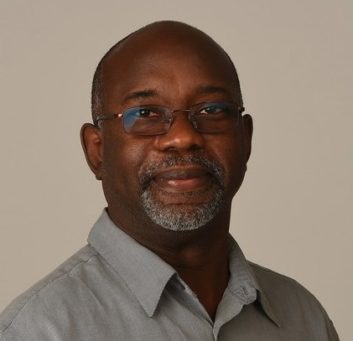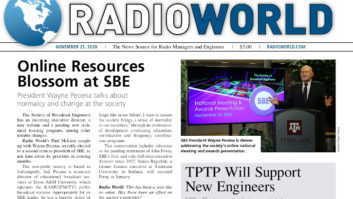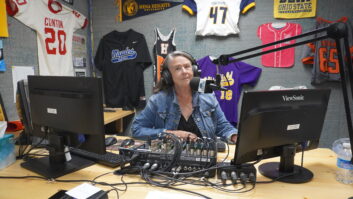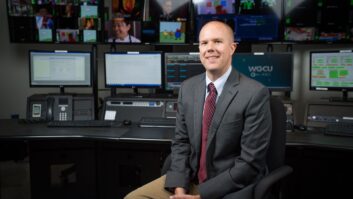One in a series of articles about the careers and experiences of Black engineers in radio broadcasting.

Rodney Belizaire has worked in engineering in New York City for 37 years, work that allowed him to travel to points across the globe as a specialist in remote radio engineering.
Belizaire is senior engineer in Media Operations Engineering at Disney Direct to Consumer International. He provides technical management for the New York radio stations of ESPN and tech support for ESPN’s and DTCI’s audio initiatives, which cross over into TV and video.
Radio World: You started early in the field, showing notable initiative for a teen.
Rodney Belizaire: When I was 13 years old, I gave myself a summer project of writing all of the CEs of all the major radio facilities I wanted to visit in New York.
I didn’t realize until years later how seeing one African American engineer, the only one I saw in my visits, made an impact on me. In seeing him do his job running the board, I saw someone who looked like me. It was at that point I realize that my dream was possible. I charted and planned my course from there.
RW: Has the acceptance level as a Black man in radio engineering changed since then?
Belizaire: I stand on the shoulders of mentors, colleagues and benefactors who paved the way for me throughout my career.
Due to the lack of diversity in broadcast engineering, there have been only a handful of those African Americans who I met coming up in the New York City community who were staff engineers, who by the way never even had aspirations to be more than that because they never felt the opportunities would come their way. Only one who was a CE, David Antoine, who I could look to for guidance and what I realized later was mentorship, on how to navigate the broadcast engineering field.
That said, there’s no way I’m in this industry without being given the opportunities by non-African Americans to prove myself. I’d like to think that my work ethic, commitment to excellence and good fortune to have crossed paths with the right people at the right time have kept me in the industry all these years.
I’d like to think that due to the diverse racial makeup and melting pot that New York City is, that as time went on, being an African American in media in general wasn’t like being a unicorn.
I’ve often wondered if I hadn’t been born and raised in NYC whether I would’ve have had the same opportunities. The cream of the crop in engineering talent works here, so I felt like I was playing catchup my whole career. I knew that I had to bring excellence to everything that I did every day.
There was also the silent but ever-present knowledge and burden that if I screwed up, I wouldn’t only be seen as just a bad engineer but I could jeopardize things for anyone who looked like me moving forward. My goal was and is every day to break stereotypes and biases that non-African Americans have about people who look like me.
[Related: “Is Diversity in U.S. Radio Engineering Possible?”]
RW: We’ve heard from other Black engineers about how they felt or were treated in certain employment circumstances. Have there been awkward situations?
Belizaire: I’ve run out of fingers and toes to count how many times that vendors, industry colleagues, etc., who have met me for the first time after dealing with me by email or phone, can’t even hide their shock that I am African American. Whatever they were or weren’t expecting when they do finally meet me, I knew that it wasn’t me.
At conventions, my attendee badge and the company I work for have opened many doors that I’m pretty sure would’ve otherwise been closed to me.
Most people tend to forget my skin color once they get to know me. I treat people the way I’d like to be treated and have been fortunate to be treated extremely well for the most part.
I’ve definitely done remotes, worked on job sites or entered buildings where I’ve experienced the standard extra level of scrutiny and circumspection.
I’ve also been stopped by the police for driving while Black in the middle of the night, on the way to a morning show remote prep, and had to have a White colleague vouch for me before I could enter a work site, because it was impossible, in the gatekeeper’s mind, that I was there to do what I said I was there to do, even if my name was on a list.
So sure, I’ve been made to feel like I don’t belong; but I don’t let that stop or define me. What defines me is that I’m there to do a job to the best of my ability and my employer’s satisfaction.
RW: What does it feel like to be in your shoes right now? What emotions do you have about the current social movement?
Belizaire: Let’s face it, most senior executives who run broadcast stations or operations don’t live in areas where they see many people or interact socially with anyone who look like me. Once they leave work, they may never see another African American unless they are at work.
Whatever they may feel about African Americans, whether it’s conscious or unconscious bias, they may not want to place anything as important as the technical reins, directly tied to their revenue, in the hands of someone who looks like me.
In general, every decision I make outside of my home is usually rooted in avoiding situations that could need or cause me to justify my existence based on someone else’s bias, prejudice, stereotypes, etc.
Someone said to me after the George Floyd incident that racism never really went away. It was only dormant. That’s a powerful statement inasmuch as even with the societal progress that’s been made, it may easily take a couple of more generations before enough biases have been put aside.
I’ll admit that I was caught off guard and dismayed by the events that led to the powder keg and frustration of the national movement, because I mistakenly thought we were more evolved as a society.
That said, I and my family do our part to dispel stereotypes, defy negative expectations and do the best we can to be part of a society that changes for the better. And I do believe this will get better with the awareness brought on by the events that put a spotlight on biases and still-pervasive racism. I pray that the conversations that have begun will continue.
RW: What can broadcasters do to improve recruitment protocols in order to bring more diversity into the technical side of radio?
Belizaire: The issue isn’t just recruitment. It’s pay parity. And education about career options since most kids don’t even see radio as a viable medium anymore.
I know that the SBE [Society of Broadcast Engineers] and others do their best to evangelize broadcast engineering, but broadcast engineering is seen as a dead end. I am guilty myself about not evangelizing for it, but the jobs are minimal, require a lot of work due to reduced staffing and are thankless in any markets outside of the top 10.
I mentor younger folks, but I can’t get them interested in engineering. The few I’ve tried to interest don’t have the fire in the belly and aren’t interested. There’s a reason why most recruits are coming from IT, which works on the studio side of things. Who’s teaching RF? Those are mostly contractor jobs now.
RW: On that topic, what would you say are the most important issues or trends in U.S. radio engineering?
Belizaire: Relevancy, adaptability and trendsetting. The issues loom larger than ever with the exponential changes in technology year over year, instead decade over decade.
How do engineers use technological trends to reach the audience wherever they are, using whatever methodologies are necessary? More than ever, the radio engineer needs to continually adapt to be media technologists, staying ahead of the curve through continual education.
SIDEBAR: Hello From Venice
We asked Belizaire to share an interesting career project memory:
“One of the pinnacles was helming the first ISDN remote originating from Venice, Italy,” he wrote.
“In 1995 while being a staff engineer at WQXR-FM in New York, America’s foremost and most listened to classical station, I was afforded the opportunity to be the remote engineer for week-long live broadcasts originating from Venice.
“There were many challenges surrounding the use of an external Adtran NT-1. Outside of Italy or to non-visitors, it’s not universally understood that Venice is many little islands that make up two larger sections separated by the Grand Canal, making up one larger island not on the Italian mainland. The Venetian telecom central office had never done or had an ISDN use request off the Italian mainland, so their telco central office wasn’t even entirely equipped to accomplish what was needed.
“Between my broken — really, nonexistent — Italian, a dedicated Italian telecom professional, our benefactor’s political connections and clout and a miracle or two, we were able to become the first broadcasters to originate a live remote from Venice using ISDN in 15 kHz mono.
“All the broadcasts were done from the Save Venice Society’s offices next to the Grand Canal, which provided great ambient sound and views for the host, who was giving play by play descriptions of the breathtaking views down the Canal and having the listeners view Venice from his mind’s eye.
“An attempt to originate a couple of the broadcasts from one of the hotels never happened because they could not move or provide ISDN in time to the second location. Whichever central office configurations that worked in the offices did not work at the hotel.
“Imagine traversing the Venetian streets with a cart full of equipment on almost cobblestone-like streets, rushing to make it back to the offices in order to get the broadcasts on the air. I will never forget that.”







